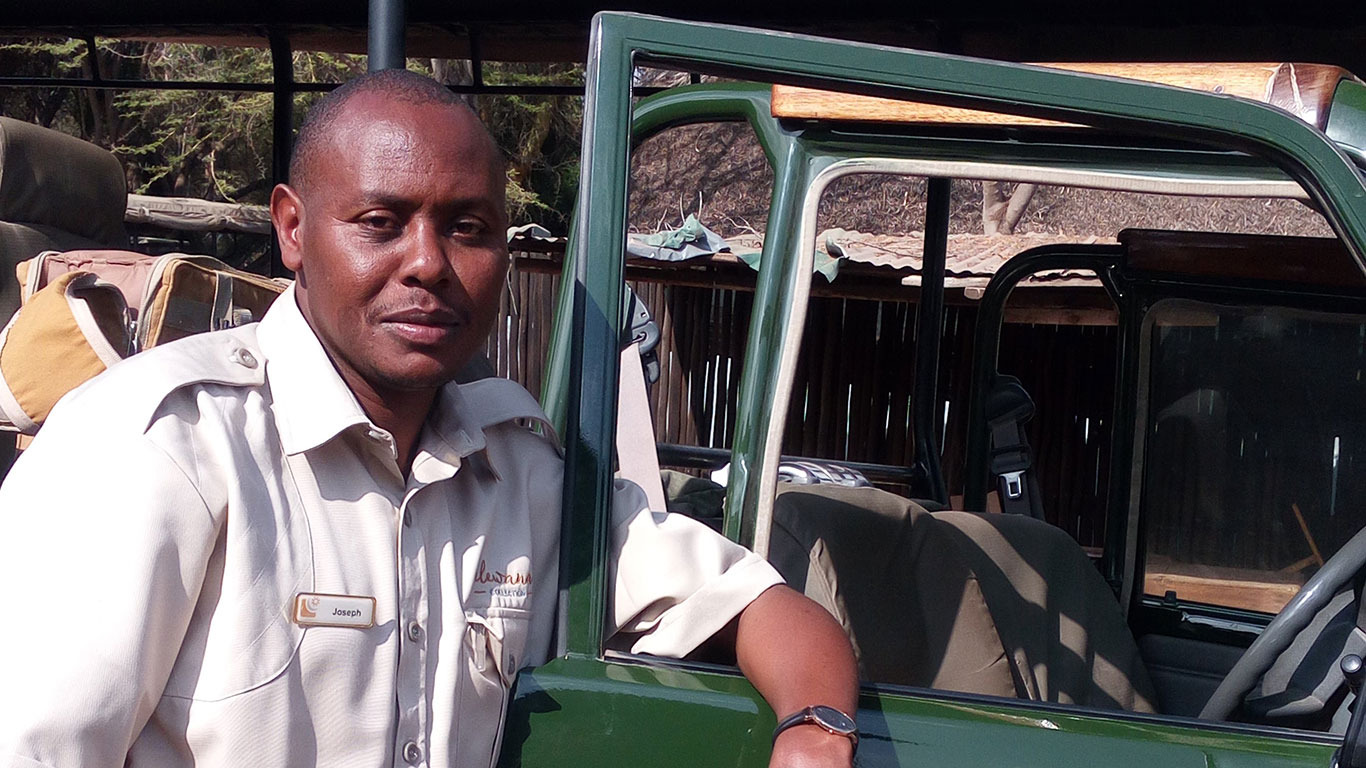
We had a chat with Joseph Chege, Gold Level Certified Guide at Tortilis Camp, to learn more about why he loves his work, what his daily routine is like, what it takes to reach gold-level certification and more.
What do you love the most about living in Amboseli?What I love about Amboseli is its geo location. Thanks to its proximity to the Equator, is it is one of the very best places to live, with an abundance of flora and fauna. Also, it is accessible by air and land, centred at the heart of a beautiful and exciting safari experience.
The topography and geology of Amboseli make it an interesting place, with some of the rarest migratory birds making a stopover in the area. The region’s different habitats support different species of animals, and it is one of the safest National Parks in the world, without any cases or incidences of poaching for more than three decades. We have a top research project of Elephants, one of the most in-depth and it a World Heritage site with some of the most renowned and iconic Big Tuskers.
How long have you been living in the bush?The East African Bush has been my office for 16 years now, during which I have been guiding and hosting many guests. It's all about PASSION.
What is a typical day for you?
On a typical day, I wake at 4:30 am and start getting everything ready for the guests starting with checking the condition of the Safari vehicle, then preparing guest amenities like blankets, ponchos, bean bags and binoculars.
At 6:00 am, I make sure everyone is ready to go then we jump into the jeep to start our drive, keeping our eyes peeled for the local inhabitants as we wait for the sunrise with the backdrop of the peak of the majestic Mount Kilimanjaro. Morning early hours are the best for birders and offer the best light for photography. It is also the best time for checking the fresh game tracks before they are blown off by the wind.
As dawn catches up and it starts getting hot, most of the predators start disappearing in the thick bushes and shade, which changes the behaviour of other mammals that start heading to the water marsh area.
After the wildlife viewing, we head for a surprise hot bush breakfast, with our “flying kitchen” in the middle of the wilderness. Post breakfast, guests have a chance to relax and recover from the morning excitement.
Around 3:30pm, prior to the evening game drive, I meet with the guests for a debriefing on the planned activities while having tea/coffee and the cake of the day.
Interested guests are also invited to visit the Community School funded and sponsored by Tortilis Camp or visit the local Maasai community for a once-in-a-lifetime experience and interaction with their authentic traditional activities.
If guests prefer to go for a game drive, we head towards the swamp marshy areas with the biggest concentration of animals. As the light fades while admiring the spectacular view of Mount Kilimanjaro, I take the guests in an open patch or a special site on top of a hill to watch the sunset while having some drinks and nibbles, waiting for the sun to disappear and the moon and the stars to come out, chatting with guests about the experiences that they had over the days spent together.
After unwinding on the day’s activities and making sure that all guests are safely back to their respective rooms, I turn myself in for some well-earned shut eye.
What makes Elewana Tortilis Camp Amboseli so special?
Tortilis Camp is the only accommodation in the area on a pristine unspoiled private conservancy measuring 35,000 Acres. It is a very exclusive, small camp without any modern structures in the Conservancy. One of the ancient migratory corridors for elephants, which has not been encroached by humans, is next to the camp.
What is your most memorable animal sighting?I have so many memories of animal sightings, but I will never forget that special spectacle of a pack of African painted wild dogs, 23 of them, at the midday heat lolling in the dusty road under the scorching sun, rolling on their backs, playing, and grooming, totally oblivious to their audience. A very rare to sight in Amboseli!
What personality traits and skills do you think make a great safari guide?Being a Safari guide, you are the true face of the company, camp, and the country. The guide needs to have the highest personal integrity and having passion in what we do, no matter the circumstances, is the key.
Also, the guide should not compromise the safety of his guests or the animals, just to please some guests.
Is there an animal that you like to spot the most?Although I am an ardent bird enthusiast (and the Secretary Bird has been my favourite), I believe cheetah is my all-time favourite animal, especially a mother with her Cubs. They are very successful specialised hunters with almost 70 % of success with hunts. I studied cheetah for four years and I came to observe that, out of all predators, it's only the cheetah that will take its cubs into a "private training academy." The cubs are very disciplined and whenever the mother is hunting, they don’t spoil the scenes like other young cubs of cats. They are very shy and very elusive, and their population is declining in large numbers. Whenever I spot one, it usually adds to my highlights of the day in the African Savannah Bush.

